Intro
Identify 5 herpes signs and symptoms, including cold sores, genital herpes, and shingles. Learn about herpes simplex, herpes zoster, and herpes outbreaks to manage and treat the condition effectively.
Herpes is a common viral infection that affects millions of people worldwide. It is caused by the herpes simplex virus (HSV) and can manifest in different parts of the body, including the skin, mucous membranes, and genital areas. Recognizing the signs and symptoms of herpes is crucial for early diagnosis, treatment, and prevention of complications. In this article, we will delve into the common signs of herpes, exploring their characteristics, causes, and implications for overall health.
The importance of identifying herpes signs cannot be overstated. Early detection allows individuals to seek medical attention, reducing the risk of transmission to others and minimizing the severity of symptoms. Moreover, understanding the various manifestations of herpes can help individuals take proactive steps to manage their condition, prevent recurrences, and maintain their quality of life. As we explore the signs of herpes, it is essential to remember that each person's experience may vary, and some may exhibit mild or no symptoms at all.
Herpes can be asymptomatic, meaning that some individuals may not display any noticeable signs or symptoms. However, when symptoms do appear, they can range from mild to severe and may include painful blisters, sores, or rashes. The virus can also cause systemic symptoms, such as fever, fatigue, and swollen lymph nodes. As we discuss the signs of herpes, it is crucial to recognize that the infection can affect anyone, regardless of age, gender, or background. By understanding the signs and symptoms of herpes, individuals can take control of their health, make informed decisions, and seek medical care when needed.
Common Signs of Herpes
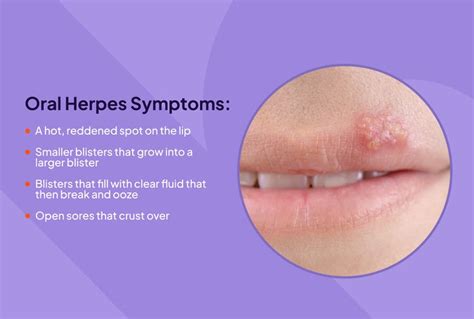
Types of Herpes Infections
Herpes infections can be classified into two main categories: herpes simplex virus type 1 (HSV-1) and herpes simplex virus type 2 (HSV-2). HSV-1 typically affects the skin and mucous membranes, causing oral herpes or cold sores. HSV-2, on the other hand, primarily affects the genital areas, resulting in genital herpes. However, it is essential to note that both types of viruses can infect any part of the body, and the symptoms may overlap or vary.Oral Herpes Signs
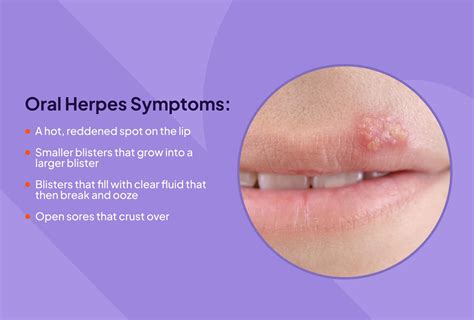
Treatment Options for Oral Herpes
While there is no cure for oral herpes, various treatment options can help manage symptoms and reduce the frequency of outbreaks. These may include: * Antiviral medications, such as acyclovir or valacyclovir * Topical creams or ointments, such as docosanol or lidocaine * Pain relievers, such as ibuprofen or acetaminophen * Cold compresses or warm baths to reduce discomfortGenital Herpes Signs

Prevention and Transmission
Genital herpes can be transmitted through skin-to-skin contact, including vaginal, anal, or oral sex. To reduce the risk of transmission, individuals can take the following precautions: * Practice safe sex, using condoms or dental dams * Avoid skin-to-skin contact during outbreaks * Get tested for herpes and other STIs * Disclose herpes status to sexual partnersOther Signs of Herpes
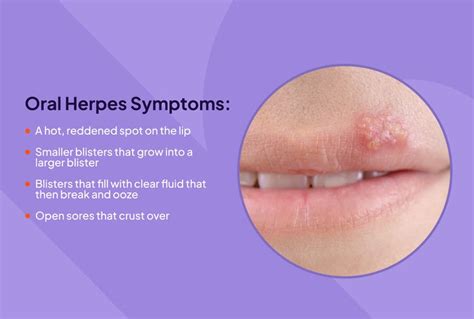
Complications and Risks
If left untreated, herpes can lead to various complications, such as: * Increased risk of HIV transmission * Neonatal herpes * Herpes keratitis * Herpes encephalitis * Meningitis or encephalitisDiagnosis and Testing
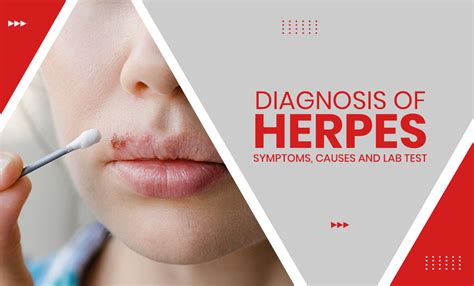
Interpreting Test Results
Understanding test results is crucial for accurate diagnosis and treatment. Individuals should consult their healthcare provider to discuss test results, ask questions, and determine the best course of action.Living with Herpes
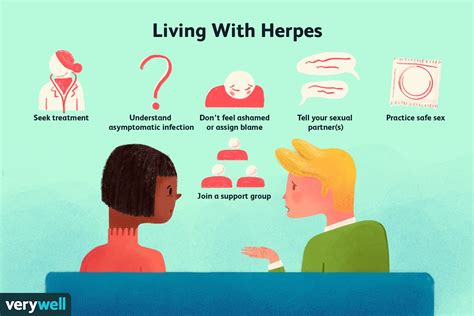
Coping with Emotional Impact
Herpes can have a significant emotional impact, affecting self-esteem, relationships, and overall well-being. Individuals can cope with these emotions by: * Seeking support from loved ones or support groups * Practicing self-care and stress management * Focusing on positive aspects of life * Educating themselves about herpes and its managementWhat are the common symptoms of herpes?
+The common symptoms of herpes include painful blisters or sores, itching or tingling sensations, redness and swelling, and fever and swollen lymph nodes.
How is herpes transmitted?
+Herpes can be transmitted through skin-to-skin contact, including vaginal, anal, or oral sex. It can also be transmitted from mother to child during childbirth.
Is there a cure for herpes?
+There is no cure for herpes, but various treatment options can help manage symptoms and reduce the frequency of outbreaks.
Can herpes be prevented?
+While there is no surefire way to prevent herpes, individuals can reduce the risk of transmission by practicing safe sex, getting tested for herpes and other STIs, and disclosing herpes status to sexual partners.
How can I manage herpes symptoms?
+Individuals can manage herpes symptoms by taking antiviral medications, practicing self-care and stress management, and seeking support from healthcare providers, friends, and family.
As we conclude our discussion on the signs of herpes, it is essential to remember that education and awareness are key to managing this condition. By understanding the common signs and symptoms of herpes, individuals can take proactive steps to protect their health, prevent transmission, and maintain their quality of life. If you have any questions, concerns, or personal experiences with herpes, please feel free to share them in the comments below. Remember to consult your healthcare provider for personalized advice and treatment. Share this article with others to help spread awareness and promote a healthier community.
